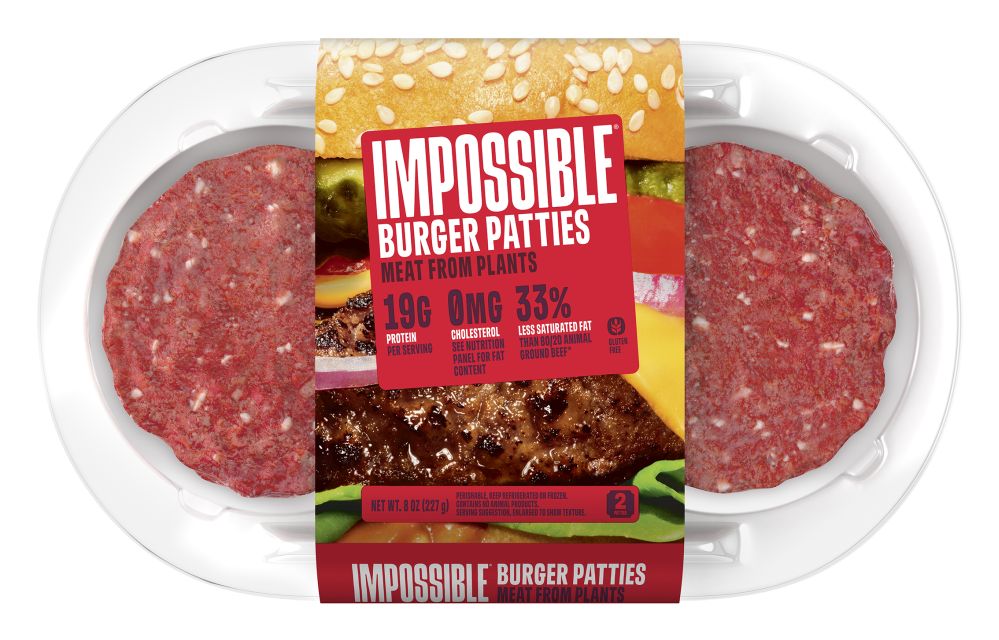The US Patent Trial and Appeal Board (PTAB) has invalidated 23 out of 24 claims in an Impossible Foods patent following a challenge by Motif FoodWorks, but denied requests to review six other patents also at issue in a high-profile legal dispute between the two foodtech firms.
The parties are embroiled in litigation* over the use of meaty-tasting heme proteins in plant-based meat alternatives, which began in March 2022 when Impossible Foods accused Motif of patent infringement.
Impossible Foods’ heme protein is identical to soy leghemoglobin, a protein found in nodules attached to the roots of nitrogen-fixing plants such as soy; Motif FoodWorks’ HEMAMI heme protein is identical to bovine myoglobin, which is found in the muscle tissue of cows. Both are produced via precision fermentation using a genetically engineered strain of yeast.
Impossible has accused Motif of IP theft, while Motif argues that the parties’ proteins are different, and that many of the inventions claimed in Impossible Foods’ patents are obvious and disclosed in the prior art.

PTAB: ‘Motif has proven…. that claims 1–12 and 14–24 of the ’096 patent are unpatentable’
The lawsuit originally focused on a single US patent granted to Impossible Foods (10,863,761) but has subsequently been expanded to cover a suite of the company’s patents. These were in turn challenged by Motif at the US Patent Trial and Appeal Board (PTAB), which asked the PTAB to institute inter partes reviews (IPRs) of all of the patents at issue in the litigation.
According to the PTAB, six out of seven of Motif’s IPR requests have been denied, with the PTAB concluding in each case that Motif “has not demonstrated a reasonable likelihood that it would prevail with respect to at least one challenged claim.”
However, the PTAB did agree to review Impossible Foods’ US patent 9,943,096, and issued a final written decision on June 12 concluding that Motif had “proven by a preponderance of the evidence that claims 1–12 and 14–24 of the ’096 patent are unpatentable.”
The patent in question (Methods and Compositions for Affecting the Flavor and Aroma Profile of Consumables) covers a “ground beef-like food product” that “contains no animal products” and that when cooked, “results in the production of at least two volatile compounds which have a beef-associated aroma.”
What impact do the PTAB cases have on the related litigation?
It is too early to determine what impact the PTAB’s final written decision on the ‘096 patent may have on the ongoing litigation, with Impossible Foods noting in court filings on June 12 that the decision “is subject to rehearing and/or appeal wherein it may be reversed or modified.”
Final written decisions from the PTAB on the validity of patent claims can be admissible in related patent infringement litigation, where defendants in such cases have argued that you can’t infringe a patent that the PTAB has found to be invalid.
However, preliminary PTAB decisions to review or not to review patents are not generally admissible, with Motif telling FoodNavigator-USA in late 2022 that the PTAB’s decision to deny Motif’s requests to review other patents filed by Impossible Foods cannot be admitted into evidence during a jury trial.
The Impossible/Motif litigation, now well into its third year, has taken many twists and turns, with Motif recently accusing Impossible of hiring private investigators to “covertly” obtain info about Motif’s products, something which the court found did not violate rules of professional conduct.
Meanwhile, a decision by the European Patent Office (EPO) to revoke an EU patent held by Impossible Foods in late 2022 has no bearing on its legal dispute with Motif in the US, according to Impossible Foods, which has appealed the EPO decision (follow the proceedings here).
Impossible Foods did not respond to a request for comment on the latest developments at the PTAB or the ongoing litigation, while Motif FoodWorks told AgFunderNews that, “At this time, we have no comment on the ongoing litigation.”
*The case is Impossible Foods v Motif FoodWorks. Case #1:22-cv-00311 filed March 9, 2022





